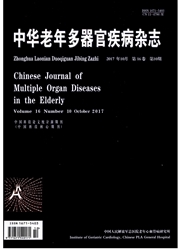

 中文摘要:
中文摘要:
相比于巨大的能量消耗,心脏的能量储备却很少,因此心脏对能量缺乏的耐受能力很低。心肌能量代谢受代谢底物浓度、激素水平、冠状动脉血流或组织营养状况等多种因素调节。血糖异常、甲状腺功能亢进或减低、高尿酸血症等均可影响心脏能量代谢的病理生理过程。尽管以往认为高血糖是冠心病患者生存率的独立预测因子,但强化降糖并未取得一致的效果,而新近的数项临床试验反而显示强化降糖可能增加心血管死亡率。心脏与代谢日趋发展成为一门新兴的学科,本期聚焦“心脏与代谢”,希望能够起到抛砖引玉的作用。
 英文摘要:
英文摘要:
Although the human heart is metabolically one of the most active organs in the body, the heart has a relatively low ATP content. Accordingly, the heart has low tolerance for energy deficiency. The regulation of myocardial metabolism is linked to multiple factors, including substrates concentration, hormone concentrations, coronary blood flow and nutritional status of the tissue, etc. Dysglycemia, hyper/hypo-thyroidism and hyperuricemia are all involved in the pathophysiological process of heart energy metabolism. Although hyperglycemia on admission is a powerful independent predictor of survival in patients with coronary heart disease, intervention to normalize glycemia has yielded inconsistent results. Indeed, recent large randomized controlled trials have failed to show a significant decrease in mortality with intensive glycemic control, or have even shown an increased mortality risk. "Heart and metabolism" is a rising discipline. We choose "Heart and Metabolism" as the topic of the special columm in this issue and want to have it account for a modest spur to induce others to come forward with valuable contributions.
 同期刊论文项目
同期刊论文项目
 同项目期刊论文
同项目期刊论文
 Association of baseline platelet count and prognosis in patients treated by percutaneous coronary in
Association of baseline platelet count and prognosis in patients treated by percutaneous coronary in The natural course of traumatic myocardial infarction in a young patient with angiographically norma
The natural course of traumatic myocardial infarction in a young patient with angiographically norma The impacts and mechanisms of dysglycemia on endoplasmic reticulum stress-induced myocardial apoptos
The impacts and mechanisms of dysglycemia on endoplasmic reticulum stress-induced myocardial apoptos 期刊信息
期刊信息
